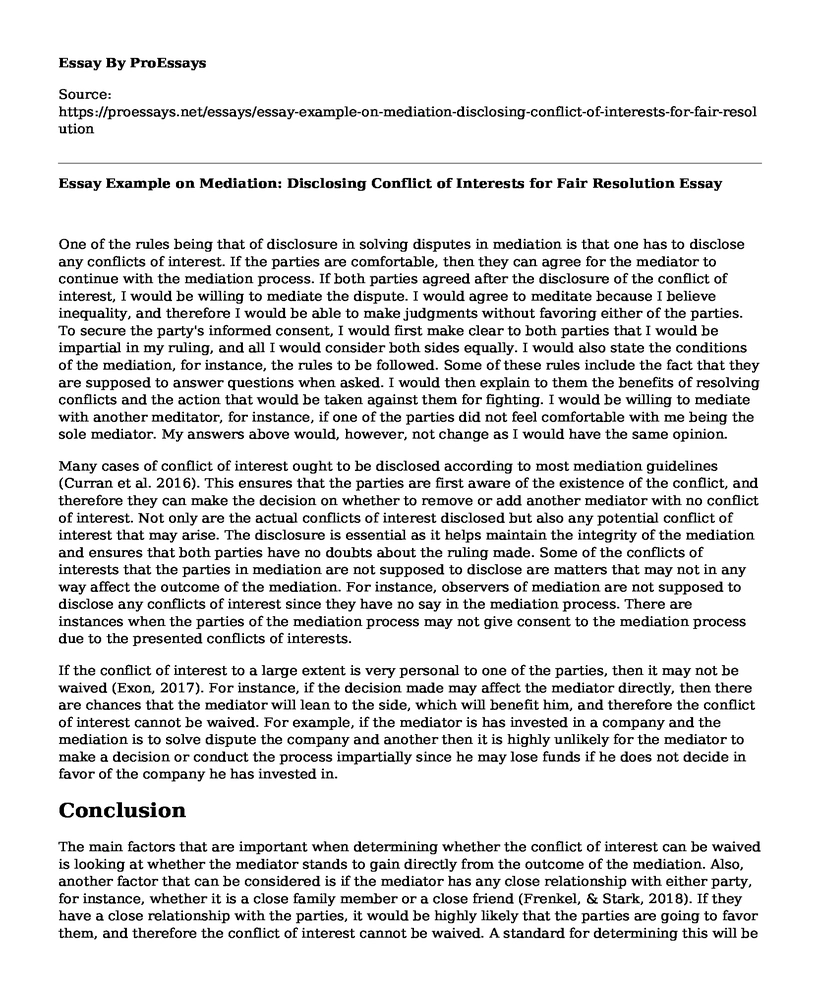One of the rules being that of disclosure in solving disputes in mediation is that one has to disclose any conflicts of interest. If the parties are comfortable, then they can agree for the mediator to continue with the mediation process. If both parties agreed after the disclosure of the conflict of interest, I would be willing to mediate the dispute. I would agree to meditate because I believe inequality, and therefore I would be able to make judgments without favoring either of the parties. To secure the party's informed consent, I would first make clear to both parties that I would be impartial in my ruling, and all I would consider both sides equally. I would also state the conditions of the mediation, for instance, the rules to be followed. Some of these rules include the fact that they are supposed to answer questions when asked. I would then explain to them the benefits of resolving conflicts and the action that would be taken against them for fighting. I would be willing to mediate with another meditator, for instance, if one of the parties did not feel comfortable with me being the sole mediator. My answers above would, however, not change as I would have the same opinion.
Many cases of conflict of interest ought to be disclosed according to most mediation guidelines (Curran et al. 2016). This ensures that the parties are first aware of the existence of the conflict, and therefore they can make the decision on whether to remove or add another mediator with no conflict of interest. Not only are the actual conflicts of interest disclosed but also any potential conflict of interest that may arise. The disclosure is essential as it helps maintain the integrity of the mediation and ensures that both parties have no doubts about the ruling made. Some of the conflicts of interests that the parties in mediation are not supposed to disclose are matters that may not in any way affect the outcome of the mediation. For instance, observers of mediation are not supposed to disclose any conflicts of interest since they have no say in the mediation process. There are instances when the parties of the mediation process may not give consent to the mediation process due to the presented conflicts of interests.
If the conflict of interest to a large extent is very personal to one of the parties, then it may not be waived (Exon, 2017). For instance, if the decision made may affect the mediator directly, then there are chances that the mediator will lean to the side, which will benefit him, and therefore the conflict of interest cannot be waived. For example, if the mediator is has invested in a company and the mediation is to solve dispute the company and another then it is highly unlikely for the mediator to make a decision or conduct the process impartially since he may lose funds if he does not decide in favor of the company he has invested in.
Conclusion
The main factors that are important when determining whether the conflict of interest can be waived is looking at whether the mediator stands to gain directly from the outcome of the mediation. Also, another factor that can be considered is if the mediator has any close relationship with either party, for instance, whether it is a close family member or a close friend (Frenkel, & Stark, 2018). If they have a close relationship with the parties, it would be highly likely that the parties are going to favor them, and therefore the conflict of interest cannot be waived. A standard for determining this will be establishing whether the mediator and either party have been in close communication or if they see each other often (Shapira, 2016).
References
Curran, D., Barry, B., Bouchier, M., Coakley, A., Dillon, J., Joyce, C., ... & Murray, G. (2016). Shaping the agenda 2: implications for workplace mediation training, standards, and practice in Ireland.
Exon, S. N. (2017). Ethics and Online Dispute Resolution: From Evolution to Revolution. Ohio St. J. on Disp. Resol., 32, 609.
Frenkel, D. N., & Stark, J. H. (2018). The practice of mediation: A video-integrated text. Aspen Publishers.
Shapira, O. (2016). A Theory of Mediators' Ethics: Foundations, Rationale, and Application. Cambridge University Press.
Cite this page
Essay Example on Mediation: Disclosing Conflict of Interests for Fair Resolution. (2023, Jun 11). Retrieved from https://proessays.net/essays/essay-example-on-mediation-disclosing-conflict-of-interests-for-fair-resolution
If you are the original author of this essay and no longer wish to have it published on the ProEssays website, please click below to request its removal:
- Paper Example on Communication Skills and Conflict Resolution in Nursing
- Paper Example on Nursing Career
- Aging Services Work: Discrimination and Oppression Among the Elderly Essay
- Analysis of the Current State of Pay System of Sprint Company
- Role of Race, Ethnicity, and Gender on Opportunities in Sport Management Essay
- Essay on Career Guidance: Encouraging People to Rise Again & Make Favorable Decisions
- Free Report Example on Exploring Dual-Income Families







